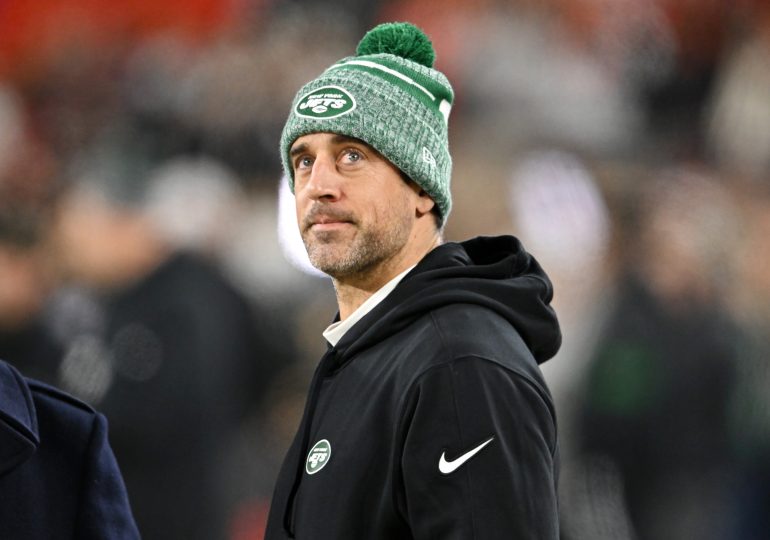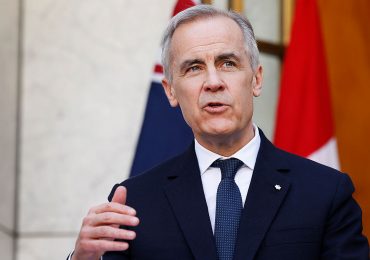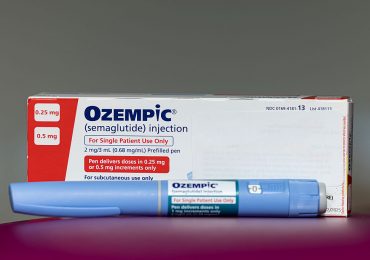Aaron Rodgers last threw a pass on September 11, in his first series in his first game as quarterback for the New York Jets. Rodgers, the four-time NFL MVP, Super Bowl champion, and future NFL Hall of Famer, tore his Achilles tendon when Buffalo’s Leonard Floyd sacked him in the season opener. His year ended that night. His lone pass was incomplete. And as the last week of the NFL regular season—and then the postseason—approaches, Rodgers’ team, at 6-10, is firmly out of the playoff race.
[time-brightcove not-tgx=”true”]
But somehow Rodgers is, once again, the talk of football, this time for suggesting, without evidence, that late-night host Jimmy Kimmel had associations with Jeffrey Epstein. He also took another swipe at medical professionals, a years-long habit he hasn’t been able to break. And that’s not good, at all, for the NFL, its fans and corporate stakeholders, and the public at large.
Rodgers hasn’t added much positivity to the public discourse in recent years, thanks to his ongoing campaign against the medical community. Back in August 2021, Rodgers said at a press conference he was “immunized” against COVID-19. He later admitted the comment was intended to mislead the public: he did not, in fact, receive the COVID-19 vaccine. Rather, after the NFL denied him a medical exemption, he said he took part in an “immunization process through a holistic doctor.” In November 2021, the NFL fined him for violating protocols for unvaccinated players by attending a Halloween party, without a mask, with his teammates. He tested positive for COVID-19 days after the party. Further, Rodgers broke NFL regulations by participating in an in-person press conference without a mask.
He’s continued to knock vaccines this season. During an October appearance on his media outlet of choice, The Pat McAfee Show—which ESPN started distributing in September—he derisively referred to Kansas City Chiefs tight end Travis Kelce, who appeared in a Pfizer ad campaign championing COVID-19 booster and flu shots, as “Mr. Pfizer.” (McAfee and his staff cackled.) He later called Pfizer a “corrupt company” and challenged Kelce to a vaccine debate that surely wouldn’t have accomplished much of anything.
Then on Tuesday’s appearance on McAfee’s show, Rodgers referred to the “alphabet gangsters”—presumably organizations like the CDC and FDA—who haven’t given “a lot of clearance” to psychedelics like ayahuasca in the United States. Rodgers has extolled the benefits of psychedelics, which he says he used last offseason.
When reached by TIME, Dr. William Schaffner, professor of preventive medicine at the Vanderbilt University Medical Center, took great pains to say he didn’t want to be quoted speaking about Rodgers specifically. But in general, he says, “when a public figure expresses a medical opinion out of their own experience, that must be treated the way we treat anybody’s anecdotal experience. Anecdotal experience is not the end of the story.”
“I think it’s especially unfortunate,” says Schaffner, “that we disparage science and a rigorous approach to determining what medications are effective and safe and therefore useful.”
In other words: enough, Aaron.
Rodgers has also brought a New Year’s headache to one of the most valuable corporations in sports: the Walt Disney Company, owner of ESPN, an NFL rights holder. On Tuesday’s Pat McAfee Show, Rodgers also disparaged a key Disney employee—ABC’s Kimmel—on a Disney platform, ESPN. While discussing the impending release of documents that would purportedly identify people linked to Jeffrey Epstein, who died by suicide in 2019 while awaiting federal sex-trafficking charges in a New York City jail, Rodgers said “there’s a lot of people, including Jimmy Kimmel, really hoping that doesn’t come out.” He also said he’ll be “popping some sort of bottle” if the list is revealed.
(The first cache of these Epstein documents was released Wednesday night: Kimmel’s name did not appear. A Disney spokesperson did not respond to TIME’s request for comment. ESPN declined to comment.)
On Tuesday, Kimmel publicly threatened to sue Rodgers. “Dear [Aa–hole],” Kimmel wrote on X, “for the record, I’ve not met, flown with, visited, or had any contact whatsoever with Epstein, nor will you find my name on any ‘list’ other than the clearly-phony nonsense that soft-brained wackos like yourself can’t seem to distinguish from reality. Your reckless words put my family in danger. Keep it up and we will debate the facts further in court.”
Kimmel has made jokes about Rodgers in the past. In 2021, when Rodgers tested positive for COVID-19 after homeopathic treatment, Kimmel said “Aaron is a Karen.” In March 2023, Kimmel called Rodgers a “tin-foil hatter” for bringing up UFOs and the Epstein list on the McAfee show. “It might be time to revisit that concussion protocol, Aaron,” Kimmel said.
McAfee—who pays Rodgers more than $1 million for appearing on his show—expressed regret about the dustup on Wednesday, though he also implied that Rodgers was just striking back at Kimmel. “I can understand why Jimmy got incredibly upset, yeah, I definitely completely understand that, especially with his position, but also I think Aaron is like, ‘Hey, this guy has said some stuff about me in his monologue’ and he’s just trying to shit talk,” McAfee said.
“We apologize for being a part of it,” McAfee said. “I can’t wait to hear what Aaron has to say about it. Hopefully those two will just be able to settle this – not court-wise – but be able to chit chat and move along.” (Representatives for Rodgers and Kimmel did not return TIME’s request for comment.)
Winning a defamation claim would be difficult for Kimmel, given his status as a public figure. Even if he’s not in Epstein’s documents, he’d have to prove, among other things, that Rodgers made his statements while knowing they were provably false. “From a straight legal perspective, Kimmel has an uphill battle,” says Charles Glasser, a First Amendment attorney and professor of media law at New York University.
Still, the blowup illustrates the toxicity of Rodgers’ words and a lack of understanding–or concern–about their impact. Rodgers remains a compelling football player, with the potential to lead the New York Jets back to their first Super Bowl in more than half a century, even at age 40. Here’s hoping he’s back on the field next season. And not yapping about Jeffrey Epstein or other topics on which he has no authority.
Leave a comment








